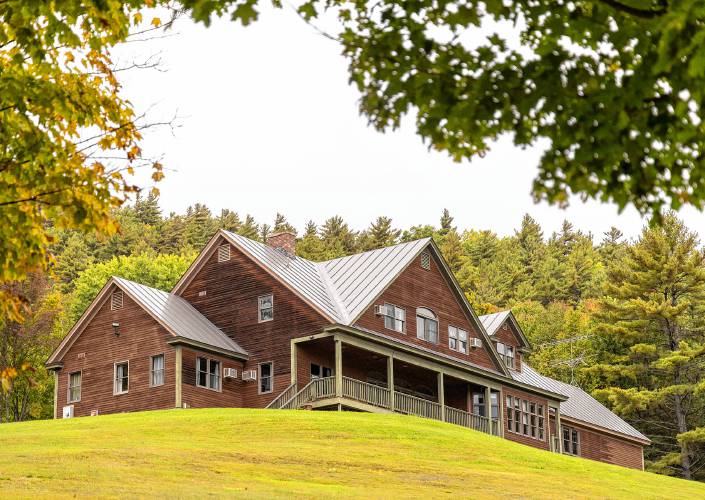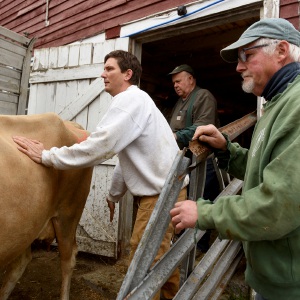Vermont shelves Newbury juvenile facility plan

The Newbury property under consideration at a Development Review Board hearing to consider the application by Vermont Permanency Initiative seeking approval to operate the “Woodside Replacement.” The meeting took place at Newbury Elementary School in Newbury, Vt., on Saturday, October 2, 2021. (Rob Strong photograph) Rob Strong
|
Published: 03-15-2024 8:31 PM
Modified: 03-16-2024 10:01 AM |
NEWBURY, Vt. — In a sharp reversal, the state of Vermont has backed off a contentious plan to open a locked juvenile facility in Newbury, as a state commissioner says he is seeking a “fresh start” with the town that bitterly opposed the project.
Vermont Department of Children and Families Commissioner Chris Winters notified Newbury town officials this week that DCF will not move forward with opening a secure juvenile detention facility in Newbury to replace the former troubled juvenile facility in Essex that closed in 2020.
The Newbury replacement facility had been in the works since 2021, and received a critical boost only four months ago when the state Supreme Court rejected the town’s contention that the facility would be a de facto “detention facility” and instead ruled that the state’s proposal qualified as a “group home” which would not run afoul of the town’s zoning restrictions.
“We’re quite pleased Commissioner Winters came out with the letter he sent us,” Newbury Selectboard Chairman Joe Parsons said on Friday, adding that speculation “had been floating around for awhile” that the state was about to reverse course “but this is the first we’ve heard anything definitive. It certainly is good to hear that he wants to take a more collaborative approach to what could happen in Newbury going forward.”
Three years ago in the wake of closing the former Woodside juvenile detention facility in Essex the state proposed converting a bed and breakfast located at a 248-acre property on a Class IV road into a secure, six-bed facility for potentially violent boys between the ages of 11 and 17, who are in the criminal justice or child welfare system and deemed too risky to be in the community but too young to be in a prison for adults.
The proposal quickly ran into heavy flak from many Newbury residents who contended that the site was the wrong location because the town lacked the appropriate infrastructure and services — such as a local police department — to handle such a facility.
Residents cited numerous reasons for their opposition, including how emergency vehicles would not be able to respond quickly to the facility’s location due to impassable dirt roads during mud season, the negative effect it would have on real estate values and concerns over the adequacy of training among the staff of the private social services provider that would be managing the facility and its programs.
DCF’s Winters said on Friday that a number of factors weighed into the department’s decision to change course, in particular a four-bed temporary facility opening soon in Middlesex, as well as identifying two other sites — one in South Burlington and a second in Vergennes — that he said look promising as locations for permanent secure facilities.
Article continues after...
Yesterday's Most Read Articles
“We're almost at the point where we can make a choice and make a public announcement about either South Burlington or Vergennes. So knowing that we have that we had to reevaluate our use of the property and building in Newbury,” Winters said.
Winters further disclosed in the letter to town officials that DCF is now instead considering utilizing the Newbury site “for a program to address another gap in the current system of care — a home-like setting for children with developmental services needs. These are children with autism or other disabilities and are not justice-involved youth” which does not “require a locked down building.”
The sigh of relief in Newbury sparked by the DCF decision is palpable.
“We’re pleased that DCF will not pursue the secure juvenile treatment facility for justice-involved youth here in Newbury," said Joanne O’Meara, a founder of Concerned4Newbury, a citizens group that petitioned the state Supreme Court to hear a reargument in the town’s case against the facility after the high court ruled in favor of the state.
She added that “the suggested future use at face value does appear to fully comply with the spirit and intent of the group home statute ... we are committed to the safety and well-being of Vermont's children, and we will continue to advocate in their best interest” and “if and when DCF choose to reengage with the community. We look forward to hearing the details of any new proposal and working collaboratively.”
Susan Culp, a newly-elected member of the Newbury Selectboard, said on Thursday that the new idea to utilize the site to serve the needs of non-violent juveniles in need of residential care “sounds a lot more like what we would traditionally think of as an actual group home and a step in the right direction. I'd be very interested to hear the details of what they might be proposing.”
Parsons, who is also a state representative representing Newbury in the Legislature, noted that he has introduced a bill in the House that would effectively “clarify” language in statutes that would clearly define “group home.”
“It's basically only a couple sentences that says you can't lock people in a building and then call it a group home so no other towns have to go through what we went through,” Parsons said of his bill, H.830.
Contact John Lippman at jlippman@vnews.com.

 A Life: Richard Fabrizio ‘was not getting rich but was doing something that made him happy’
A Life: Richard Fabrizio ‘was not getting rich but was doing something that made him happy’ Herd departs Hartford’s last remaining dairy farm
Herd departs Hartford’s last remaining dairy farm 
